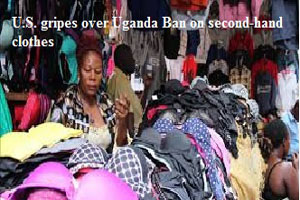
U.S. gripes over Uganda Ban on second-hand clothes
YarnsandFibers News Bureau 2016-09-03 16:00:00 – AfricaThe Ugandan government has in the past proposed a ban on importation of second hand clothes, commonly known as mivumba, in order to protect and promote the local textile industry. But the US embassy expressed concern over ban on the importation of second hand clothes as it would have drastic effects on both Uganda and the US because of the significance of trading in used clothing.
For now, the ban remains on paper and has never been implemented. Most Ugandans can't afford new clothes and depend on used-clothes for their clothing needs.
URN wrote to the US embassy spokesman, Christopher Brown, asking why the US ambassador would be so concerned about the ban on importation of used-clothing in Uganda and yet the US also encourages development of the local textile industry.
URN also sought to know whether ambassador Malac's concerns were driven more by the need to protect US business interests rather than protection of local interests of ordinary Ugandans.
In an email response, Brown said that the United States shares the concerns of many Ugandans in the private sector and government who worry that a ban on the importation of used-clothing is not the best way to protect Uganda's interests and facilitate the development of a domestic textile industry.
According to Brown, a ban could result in the loss of thousands of jobs for Ugandans who rely on the trade and sale of used clothing for their livelihood. A ban, he says, would also cut off access for many Ugandans to quality and affordable clothing.
Brown further argues that a ban runs counter to the spirit of the African Growth and Opportunity Act (AGOA), which seeks to open and expand markets and not to restrict access to them.
He explained that AGOA eligibility requirements state that the beneficiaries, like Uganda, must make continual progress toward eliminating barriers to US trade and investment, which would include used clothes.
Brown admits that the East African Community (EAC) is one of the most important markets for US exports of used clothing. The US government estimates that the EAC accounts for one-fifth of total US exports of used clothing, which last year totaled $147m, equivalent to nearly Shs 500bn.
Brown argues that the proposed ban would have a significant and adverse effect on US employment, adding that the US estimates at least 40,000 US jobs related to the collection, processing and distribution of used clothing would face negative consequences if the ban were effected.
By restricting market access, this ban would counter Uganda's key point to US investors - that Uganda is open for business.
According to Brown, AGOA's duty-free access is a tool for Ugandan manufacturers to export competitively to the US. This tool and the access it provides Uganda to one of the largest markets in the world, would be jeopardised if Uganda imposed a ban and closed off its market for the used-clothes sector.
Uganda's eligibility under AGOA is presently under review in the US. In addition to what Brown says, the eligibility is also premised on issues of governance and human rights.
Uganda has been performing dismally under AGOA, with duty-free exports declining from about Shs 11bn to about Shs 4bn in 2015. The US government has also extended the life of AGOA up to 2025.
The spokesperson of Kampala Capital Traders' Association (KACITA), Issa Sekitto, also said that ban on importation and trade in used-clothing would not only be absurd but cruel, inconsiderate and disruptive.
The used-clothing chain is elaborate and supports the livelihood of so many people making any ban, whether abrupt or spread out, disruptive and very dangerous.
Paradoxically, used-clothing is also one of Uganda's major re-exports to neighbours South Sudan, Burundi, the Democratic Republic of Congo, Tanzania and Kenya.
KACITA's position is against any ban and that government should leave sentiments and deliver on things like industrialisation and in particular development of the local apparels industry.
According to Sekitto, the government should promote and develop the local textiles industry in the hope that with time they would gradually replace used clothing if their quality is better. The present alternatives from China and other Asian countries simply do not match the quality of used-clothing coming from the West.
Market Intelligence
Ask for free sample Report

experience
Customer Base
dedicated team
Countries Served Worldwide









